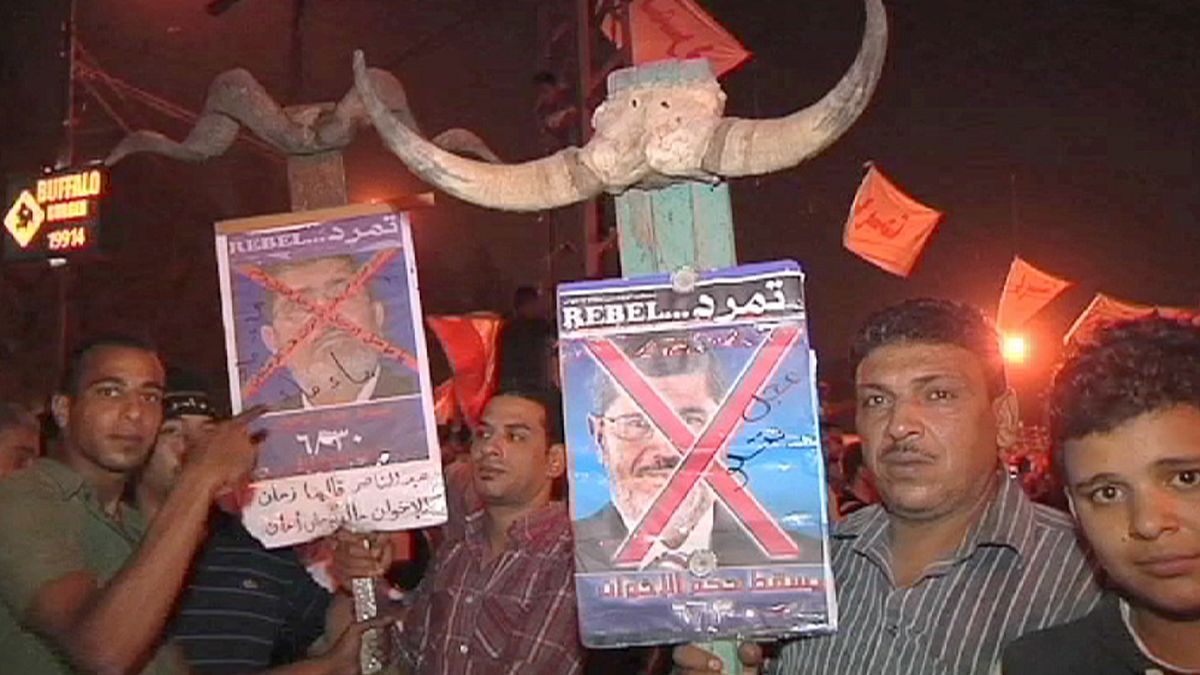One year ago, there were demonstrations in Egypt bigger than any in its modern history — even bigger than in the Arab Spring uprising of 2011 that brought about the end of former president Hosni Mubarak’s regime. That uprising was a cry for democratic change, yet two years later Egyptians were filling central Cairo’s Tahrir Square again.
Many were angry with the performance of the democratically elected Mohammed Mursi. The army removed him and another military chief — like Mubarak had been — won the public’s mandate to govern, General Abdel Fattah al Sissi, with some 97 percent of the vote.
Mursi took office in June 2012, the first civilian chosen by the majority as president in Egypt’s first free poll. But he didn’t work consensually, failed to unify, showed little flexibility and listened little. So the people took to the streets again.
A year after being elected to power, he was toppled. The army took the reins of the country and went on a wild hunt for members of the Muslim Brotherhood to which he belonged, the Pan-Islamic, religious and social movement that had risen to political heights.
He was jailed. Supporters rose up, and some 1,400 were killed by security forces.
Some 15,000 were arrested, 683 of them sentenced to death by the courts. Of these sentences, 183 were confirmed, including the top Brotherhood leader, Mohammed Badie.
Sissi, former head of military intelligence, moved steadily to defeat those who presented a danger.
When Mursi presided, he named Sissi as head of the army and as defence minister. Now Sissi had built his reputation up so he was seen by many Egyptians as the only man who could restore order. That is a work in progress.
Cautiously watching Sissi to see reconstruction begin, the international community condemned the death sentences, and the sentencing of three journalists from Al Jazeera television for, according to the court, ‘spreading false news’ and ‘aiding or joining the banned Muslim Brotherhood’. They each got seven, seven and ten years in prison.
Sissi’s rule thus began with a bang, and in contrast to the generally cool reception from the West, most of the country supports the way he is quelling dissent — under a cloak of national security.
Our correspondent in Cairo interviewed an analyst about the context around the new strongman who promised “an inclusive, responsible framework away from chaos.”
Mohammed Shaikhibrahim, euronews: “Political expert Bashir Abdel Fattah, on the anniversary of last year’s 3 July ouster of Mohammed Mursi, taking a look at the realities and challenges in Egypt, how do you explain what happened on this day last year?”
Bashir Abdel Fattah, analyst: “It was neither a revolution nor a coup. A revolution doesn’t only last a few hours. A revolution changes political and social structures, as well as the redistribution of a society’s wealth. What happened did not bring that about at all. It wasn’t a coup because a military overthrow is a movement that comes from within a political regime, to change its leadership. The Egyptian army was led to intervene and remove the elected president because the president had rejected the very mechanisms — political and democratic — that placed him in office. He hung on to what he called his legitimacy. There was, therefore, no other peaceful alternative for getting rid of him. People protested, demanding early presidential elections, but the president did not react. Either the country plunged into a civil war between Mursi’s supporters and opponents, or the army stepped in as arbiter, with its monopoly on military force.”
euronews: “What are the main achievements during the past year, and the most prominent failures?”
Fattah: “The biggest advances are the restoration of the state of Egypt and the army staying together. This means the state was at stake, since the Muslim Brotherhood in power talked about the nation and not the nation-state. The second accomplishment was not letting the Egyptian army get dragged into regional conflicts where they would have got entangled, one way or another. As for the negative points, I can say there is an absence of a national consensus in Egypt, and a crisis of confidence, as Francis Fukuyama described to me when he raised the idea of confidence. He said: ‘A society can’t develop politically and democratically without there being trust between the different communities and social strata.’ Egypt now lacks confidence and national consensus. There are also many questions surrounding liberty and the acceptance of differing opinions within society, and we are living in a state of extreme confusion.”
euronews: “How do you see the future of the Muslim Brotherhood in Egypt after the organisation being outlawed?”
Fattah: “I think the future holds some surprises for us, such as the reconciliation between the second and third generations of the Muslim Brotherhood and the Egyptian state. Through this reconciliation, the Brotherhood will eventually make concessions, especially on their main demands, such as returning Mursi, parliament and the constitution… all these points. I think they’ll abandon them. But they also need some critical self-examination, just as other organisations before, like Al Jemaah Islamiyah and the Organisation of Jihad. The Muslim Brotherhood must also apologise for things it has done in the past, and accept what happened on 3 July. I think the West will have a crucial role to play in this mediation, because the West wants to re-integrate the Muslim Brotherhood in the political process.”


